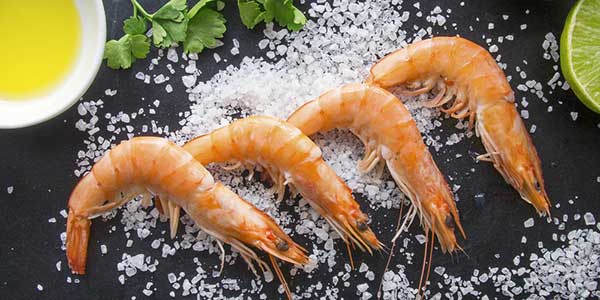
What Is Astaxanthin?
Astaxanthin is a reddish pigment belonging to a group known as carotenoids. Carotenoids are a class of phytochemicals ("plant chemicals") and one of the the most widely distributed group of pigments occurring in nature, largely providing the natural red, orange, and yellow hues in several fruits and vegetables. But the properties of carotenoids are much more than visual aesthetics, as they boast in notorious antioxidants. Interestingly, astaxanthin has shown to display higher antioxidant capacity compared to other carotenoids.
Specific to astaxanthin, the chemical is found primarily in algae and largely witnessed in salmon, lobster, shrimp, krill, and other seafood. As the fish feed off the pigment, the marine animals are exposed to the carotenoid and deepen their color. Additionally, the United States Food and Drug Administration (FDA) has approved its use of a food colorant in fish feed, upping the ante of astaxanthin in not only the marine animals, but to individuals consuming them. Research and studies have shown the consumption of such fish are not only related to its nutritional composition, but due to the astaxanthin content as well.
According to WebMD, "Astaxanthin is possibly safe when taken by mouth as a supplement. Astaxanthin has been used safely by itself in doses of 4 to 40 mg daily for up to 12 weeks. It has been used safely in combination with other carotenoids, vitamins and minerals at 4 mg daily for up to 12 months." To put the dosage numbers in perspective, wild caught salmon has the highest content of astaxanthin, offering approximately 3.6 milligrams of astaxanthin per 6-ounces, with sockeye and Coho salmon containing the most concentrated amounts.
Astaxanthin Health Benefits
Protect the Heart
Astaxanthin has shown to promote both hypolipidemic and hypocholesterolemic effects, translating to improved and lower levels of blood lipids and cholesterol. Especially when paired with fish oil, as dietary oils have shown to enhance the astaxanthin absorption in the body, the carotenoid can protect the heart against disease and damage relative to a normalized, healthy lipid profile.
Boost the Immune System
Largely related to its antioxidant properties, astaxanthin may prevent damage to immune cells. Antioxidants act as cell-protectors, combatting against molecules that may impede on normally healthy cells. With the prevention of damage to the body's self-defense mechanism, the immune system can be boosted.
Reduce Reflux Symptoms
Acid reflex can be irritating to individuals experiencing it, and can even damage the esophagus in the long run. Though the research is minimal at this time, evidence has shown a daily dose of astaxanthin has shown to improve acid reflux symptoms within a month. Additionally, the results were more pronounced and significant in Helicobacter pylori (H. pylori) infections, a bacteria likely to cause peptic ulcers.
Prevent Cataracts
Cataract is a medical condition in which the the lens of the eye becomes clouded, largely generating blurred vision. Early data suggests astaxanthin, in conjunction with other nutrients, can improve problems affecting the center of the eye.
Protect the Skin
Along with sunscreen and other skin-protecting precautions, supplementing with astaxanthin can reduce skin wrinkling by improving skin elasticity and offering skin moisture. Astaxanthin can also reduce skin damage from ultraviolet (UV) light, ultimately reducing the risk of skin cancer.
Inhibit Cancer
Along with protecting the skin against cancer, astaxanthin may have protective and inhibitory affects on cancer. Mostly related to its antioxidant properties, the powerful compound may reduce the growth of cancer cells, including breast cancer.
Lessen Menopausal Symptoms
Menopause regularly affects middle-aged women and induces symptoms associated with changing hormones. In combination with additional phytonutrients, astaxanthin may reduce hot flashes, joint pain, and moodiness that often surface during menopause.
Reduce Alzheimer's and Parkinson's Disease
Related to its potent antioxidant properties, astaxanthin may protect against oxidative damage largely linked to these neurodegenerative disorders. Additionally, its use may improve cognitive function in the aging population.
References:
Ambati RR, Moi PS, Ravi S, et al. Astaxanthin: Sources, Extraction, Stability, Biological Activities and Its Commercial Applications - A Review. Marine Drugs.
Astaxanthin. WebMD.





